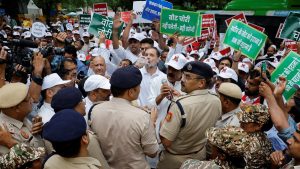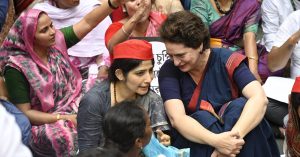New Delhi-India, August 11, 2025 — A major political showdown unfolded in the heart of the capital today as members of the Opposition’s INDIA bloc marched from Parliament House toward the Election Commission of India (ECI) headquarters, protesting the ongoing Special Intensive Revision (SIR) of the electoral rolls in Bihar and accusing the government of orchestrating large-scale electoral malpractice. The demonstration, led by Leader of Opposition Rahul Gandhi, was abruptly halted by Delhi Police, resulting in the detention of several senior MPs.

The protest began shortly after 11:30 a.m. from Makar Dwar inside the Parliament complex, with slogans of “Vote chori band karo” (Stop stealing votes) echoing through the air. However, the march barely progressed beyond Transport Bhawan before rows of barricades and heavy police deployment brought it to a standstill.
The Spark Behind the Protest
The flashpoint for today’s action was the Bihar voter roll revision exercise, which Opposition leaders allege is being conducted in a way that disenfranchises voters likely to support non-BJP parties. According to the protesting MPs, the ECI’s process lacks transparency and fairness, potentially paving the way for what they called “vote theft” in upcoming elections.
Rahul Gandhi, speaking before his detention, framed the issue not as a partisan battle but as a fight for democracy itself.
“This is not a political fight. It is a fight to protect the Constitution. We are standing for one person, one vote — and for a clean, accurate voter list,” he told reporters.
Detentions and Confrontations
The Delhi Police, citing security protocols and lack of formal permission, detained more than 30 MPs during the march. Those held included Rahul Gandhi, Priyanka Gandhi Vadra, Mallikarjun Kharge, Akhilesh Yadav, Sanjay Raut, and Sagarika Ghose. Police officials maintained that the ECI had permitted only 30 MPs to enter its premises, but the gathering far exceeded that number.

“No permission was sought for this march. The Election Commission allowed only a delegation of 30 MPs. Once we have their names, we can escort them inside,” said New Delhi DCP Devesh Kumar Mahla.
Dramatic scenes unfolded as MPs, including Mahua Moitra, Sushmita Dev, and Ranjeeta Ranjan, climbed over barricades, prompting the deployment of additional women police officers. Others, such as Kharge and Sharad Pawar, staged a sit-in on the road. Akhilesh Yadav, visibly frustrated, accused the police of being used as a political tool.
“The police are here to stop us, not to protect democracy,” he said.
Inside the Parliament Street Police Station, detained leaders raised slogans and continued their protest. Congress MP Sanjana Jatav reportedly fainted during the commotion and was taken to RML Hospital, while TMC MP Mitali Bag also collapsed in the heat and chaos.
A War of Words
The day was marked by sharp exchanges between the ruling BJP and Opposition leaders.
BJP leader and Union Minister Dharmendra Pradhan dismissed the protest as a deliberate attempt to disrupt public order.
“If anyone is working against the Constitution, it is Rahul Gandhi and his allies. The SIR is a routine process. This is a manufactured controversy meant to create anarchy,” Pradhan alleged, accusing the Congress of spreading lies about EVMs and past election results.
Congress countered with equally strong words. Senior leader Jairam Ramesh accused the government of stifling dissent.
“Right outside Parliament House, democracy is being murdered. We wanted to present a memorandum to the ECI, but we are being blocked at every step,” Ramesh told The Hindu.
Shashi Tharoor stressed that the ECI must provide substantive responses rather than hide behind procedural formalities.
“These are serious allegations and they deserve serious answers,” he said.
The Election Commission’s Position
Earlier in the day, the ECI had responded to a Congress request for a meeting, granting an appointment for 12 noon. In its letter to Congress MP Jairam Ramesh, the Commission asked for the names and vehicle details of up to 30 attendees, citing space constraints. However, the meeting never materialised as the bulk of the protesting MPs were stopped en route.
Congress President Mallikarjun Kharge later suggested that the ECI could have avoided the confrontation altogether.
“This was a peaceful demonstration by senior parliamentarians. The Commission could have allowed us all inside a hall to speak, instead of picking only 30. That would have been the democratic way,” he said.
Voices from the States
Support for the detained leaders poured in from across the country. Telangana Chief Minister A. Revanth Reddy condemned the police action, calling it an affront to democratic values.
“Rahul Gandhi, Priyanka Gandhi, and other MPs have every right to protest. Their detention is unacceptable,” Reddy said.
Shiv Sena (UBT) MP Sanjay Raut, speaking before the march began, raised an eyebrow-raising question:
“Are MPs now considered terrorists?”
Escalating Tensions
The situation in central Delhi was tense from the early hours, with police fortifying key intersections and deploying quick response teams. Security vehicles ringed Nirvachan Sadan, and traffic diversions were in place to prevent congestion.
By midday, the protest had shifted from a march to multiple sit-ins and scuffles, with images and videos of MPs being bundled into police buses dominating social media feeds.
Around 2:52 p.m., after hours of detention, the Delhi Police released all MPs, but the political storm was far from over. The Congress announced that Mallikarjun Kharge would host a dinner meeting with INDIA bloc MPs later in the evening to discuss next steps.
Political Implications
While today’s events revolved around Bihar’s voter roll revision, the deeper conflict reflects an escalating standoff between the Opposition and institutions they accuse of being compromised. For the BJP, the incident fits into a larger narrative of portraying the Opposition as disruptive and anti-constitutional.
Political analysts note that the optics — MPs scaling barricades, fainting in the heat, shouting slogans as police drag them away — could work both ways. For Opposition supporters, it reinforces the idea of a principled struggle against authoritarianism. For critics, it may seem like a choreographed spectacle.
The Road Ahead
Rahul Gandhi made it clear that today’s protest was only the beginning.
“We will continue this fight. We are not going to stop until the voter lists are clean and fair. This is not about party politics; it is about the soul of our democracy,” he said before being taken away by police.
With assembly elections in Bihar on the horizon and the 2029 general election looming, the battle over voter rolls is likely to intensify. The INDIA bloc appears determined to keep the issue in the public eye, while the BJP will aim to dismiss the protests as politically motivated theatrics.
Conclusion
The events of August 11, 2025, have added another flashpoint in the already heated relationship between the Opposition and the central government. While the ECI’s position remains officially neutral, its handling of the situation will be closely scrutinised in the weeks ahead.
For now, the images of barricade-climbing MPs, detained leaders, and slogans demanding “fair votes” will linger in the nation’s political memory — a reminder that the fight over the ballot box remains as fierce as ever.




